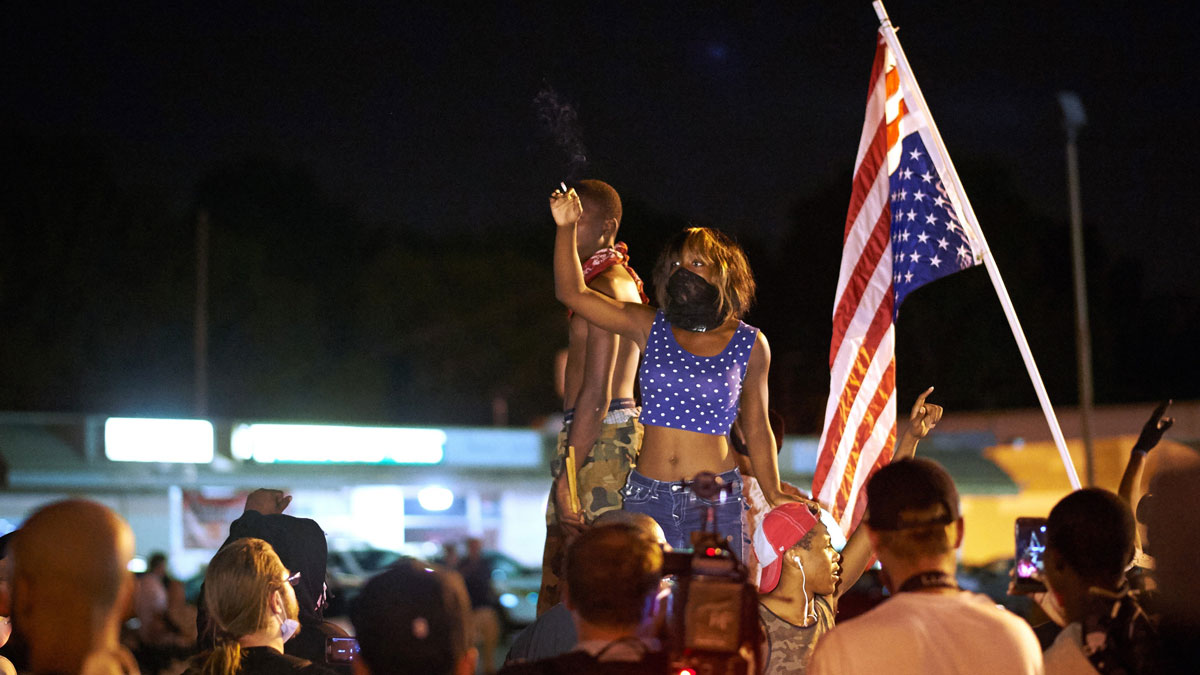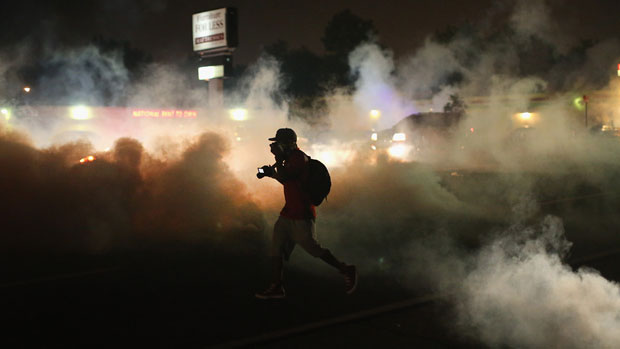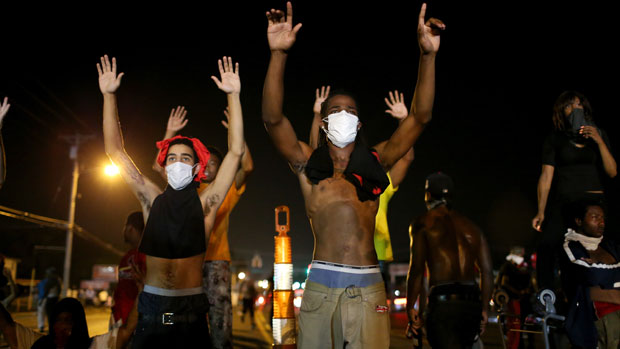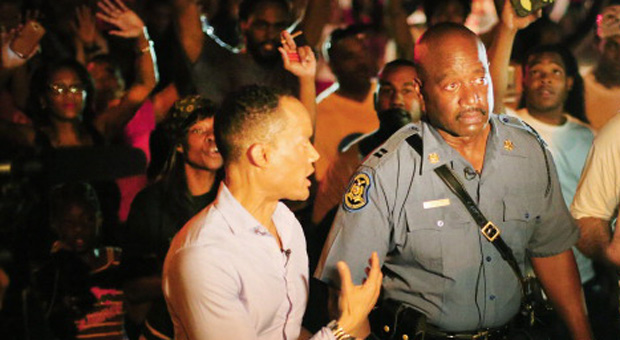Ferguson: state of emergency declared as protests continue
Dozens arrested as armed vigilantes known as 'oath keepers' add to tensions on street

A free daily email with the biggest news stories of the day – and the best features from TheWeek.com
You are now subscribed
Your newsletter sign-up was successful
Second black man shot dead by police in Missouri
20 Aug
A second black man has been shot dead by police in Missouri, less than a fortnight after the killing of unarmed teenager Michael Brown, further fuelling racial tensions as protests continue in Ferguson.
The Week
Escape your echo chamber. Get the facts behind the news, plus analysis from multiple perspectives.

Sign up for The Week's Free Newsletters
From our morning news briefing to a weekly Good News Newsletter, get the best of The Week delivered directly to your inbox.
From our morning news briefing to a weekly Good News Newsletter, get the best of The Week delivered directly to your inbox.
Police have been accused of using excessive force in the latest incident, in which a man said to have learning difficulties and brandishing a knife was killed after "behaving erratically". The shooting took place in largely black neighbourhood in St Louis, close to Ferguson.
A witness to the shooting told The Guardian "I think it was excessive. People said he had a knife but if he had a knife they could have shot him in the foot. Or tasered him. They didn’t have to kill him." Another asked "Do you think they would kill a white person like this?"
The shooting follows the killing of unarmed teenager Michael Brown less than two weeks ago. That incident triggered nights of protests and violent clashes with police.
People took to the streets again on Tuesday after the second killing, but what had been a largely peaceful protest turned violent in the early hours of the morning. Its "unclear what led to increase in tensions, but protesters were marching peacefully for most of evening", the BBC's Rajini Vaidyanathan reported.
A free daily email with the biggest news stories of the day – and the best features from TheWeek.com
Police did not use tear gas, rubber bullets or stun grenades as they had on previous nights, but did make 47 arrests. "I believe there was a turning point tonight", police captain Ron Johnson said.
Missouri governor Jay Nixon has called for a "rigorous prosecution" in the Michael Brown case. Members of the grand jury are expected to begin hearing evidence today to determine whether or not criminal charges should be brought against the officer who shot Brown, named last week as Darren Wilson.
Ferguson: shots fired as unrest continues
19 Aug
Despite the deployment of the National Guard to Ferguson, Missouri, the city experienced another night of violence last night as two people were shot and 31 arrested.
Police Captain Ron Johnson said a small group of protesters fired shots and threw Molotov cocktails and other weapons at police. He said they responded with tear gas, stun grenades and numerous arrests.
Lesley McSpadden, the mother of the unarmed teenager who was shot dead by police ten days ago said the violence would only end once justice had been delivered and the officer responsible for his killing was arrested, the Washington Post reports.
Several journalists were among those arrested. They included Getty's veteran photographer Scott Olson, who has taken many of the most widely published images of the protests, the Guardian reports.
Johnson said the media had "got in the way" of the operation, and that police may revise their policy on media access. Officers "may take journalists into custody" if they are not easily identifiable, he said. "In the midst of chaos we have to be safe."
Johnson also appealed to peaceful protesters to limit their demonstrations to daylight hours. At night "masked criminals" come onto the streets, he said.
Last night Barack Obama appealed for calm in the St Louis suburb, the BBC reports. He told protesters that while he understood the "passions and anger" caused by the shooting of Michael Brown, responding with violence "only serves to raise tensions and stir chaos".
He said the response from the National Guard, whose presence some have described as inflammatory, should be "limited and appropriate".
US Attorney General Eric Holder is expected to travel to the city on Wednesday to meet with FBI agents running the investigation into Brown's death.
Ferguson: National Guard called in to stop violence
18 Aug
The US State of Missouri will deploy the National Guard to Ferguson in an attempt to "help restore peace and order and to protect citizens", the BBC reports.
This follows a week of violent clashes between police and protesters in the St Louis suburb after the shooting of an unarmed black teenager, Michael Brown, last week. Yesterday, Missouri Governor Jay Nixon declared a state of emergency and imposed a curfew across the city.
Despite the curfew, violence in Ferguson has reached new levels overnight, with police firing tear gas and flash grenades into the crowds. Protesters had fired shots and thrown Molotov cocktails, police captain Ron Johnson said, leaving officers "no alternative but to elevate our response".

However, protesters say that police attempted to violently disperse the peaceful crowds hours before the curfew was even in place, the BBC's Ben James reports.

The preliminary results from an independent autopsy have concluded that Brown was shot by a police officer six times, twice in the head and four times in the arm, the New York Times reports.
He was reportedly stopped for jaywalking, despite earlier police claims that he had been apprehended in relation to a robbery of a nearby shop. The police have been criticised for releasing CCTV footage from the store, with Missouri Governer Jay Nixon saying it "appeared to cast aspersions" on Brown and "made emotions raw".
The police officer responsible for the shooting has been named as Darren Wilson. He has been on paid administrative leave since the incident.
Amnesty International has called for an investigation to be launched into police tactics. The organisation sent a delegation to Ferguson on Friday to show law enforcement that the "word is watching", the Huffington Post reports.
"This is a moment for people around the country – and around the world – to join the Ferguson community in raising concerns about race and policing, and about the impact of militarisation on our fundamental right to peacefully assemble," Amnesty's executive director Steven W Hawkins said.
Ferguson: vigils not violence as America remembers Michael Brown
15 Aug
Thousands took to the streets of New York, Boston, Detroit, Chicago and several other major cities almost a week after the teenager was gunned down in Ferguson, Missouri. Mothers held posters saying "could have been my baby" while others carried placards saying "hands up, don't shoot".
In contrast to the violence on four previous nights in the city of Ferguson, protesters marched side-by-side with some state troopers and local police last night. This included the new head of investigations, Captain Ronald Johnson (pictured below) from the Missouri Highway Patrol, raised in the area and brought in to calm race relations.

"The transformation over the past 24 hours here has been extraordinary", says the BBC's Aleem Macbool, reporting from Ferguson. He said criticism of the police's heavy-handed approach to protesters and rioters had led to a change in tactics.
But Missouri governor Jay Nixon said there was still a long way to go to improving relations between the police and the public. "We're going to have to regain trust", he said.
The riots have highlighted a wider issue within American law enforcement, what many are calling "the militarisation" of the police. "Why were there Iraq-grade trucks even at the ready in the police station of an American suburb?" asks The Guardian's Sadhbh Walshe. "The toys of war do not belong in a town of 21,000".
Ferguson, Missouri: Why US city is 'at war' with police
14 August
A fourth night of violence has taken place in Ferguson, Missouri following the death of African American teenager Michael Brown, shot by police on Saturday. SWAT teams fired rubber bullets and tear gas at protesters and two journalists were arrested, amid allegations of assault and brutality.
Brown's death has sparked anger among locals over what they claim is the police force's indiscriminate targeting of black people.
Washington Post reporter Wesley Lowery and Huffington Post reporter Ryan J Reilly were arrested and apparently assaulted in the city today as protesters threw Molotov cocktails and looted shops, while the police responded with rubber bullets, tear gas and arrests.
"This is a war," one of the protesters, Charles Jolley, told The Guardian, "and we are soldiers on the front line".
What caused this 'war'?
The protests and riots were triggered by the killing of Michael Brown Jr by police in Ferguson Missouri, just two days before the teenager was set to start college. The 18-year old student was unarmed at the time and the circumstances surrounding his death remain unclear.
Police say they shot Brown after he attacked an officer and tried to take his gun, but several witnesses refute this claim.
Dorian Johnson witnessed the killing, and told MSNBC that a white police officer choked Brown after he refused to get on the floor and allow the officer to search him. Johnson said that they struggled and then policeman fired several consecutive shots at Brown.
"This is a boy who did everything right," Cornell Brooks, the president of the National Association for the Advancement of Colored People told The Guardian, "who never got into a fight, who stayed in school."
The identity of the police officer has not been revealed and the investigation has now been taken over by the FBI.
Other underlying causes
Ferguson is a city where racial tensions have long been present. Its population is 67 per cent black but 93 per cent of the city's police officers are white. Recent figures reveal a stark racial imbalance in police searches with 12 times more police searches carried out on black drivers as white.
"Black people see all these layers of white authority that do not like them, do not understand them and do not respect them," said Patricia Bynes, a Democratic committeewoman for the city.
This case is part of "a long and painful trend of black, unarmed men killed by the cops", writes Nicola Flatow for Think Progress. She points out that anger is rising across America after two other similar cases in Ohio and New York this month alone.
The social media response
US media networks caused outrage by choosing to use a picture of Michael Brown in which it appeared as if he were displaying gang signs. Critics said they purposefully chose a picture where the victim "looked like a thug".
Social media users responded by starting the hashtag #IfTheyGunnedMeDown to protest at the way young black people are portrayed by the media. Many users posted two pictures of themselves, asking which the media would use.
#IfTheyGunnedMeDown would I be labeled an honor grad or a blunt smokah pic.twitter.com/BCaRqMCMn8— (@TopFlightRod) August 11, 2014
African American communities across the US have come together in protest against the killing.
Such a powerful image from the student of Howard University. #MichaelBrown pic.twitter.com/RsuPS8zAhE— Benjamin Crump, Esq. (@attorneycrump) August 14, 2014
The #Ferguson hashtag has gone global, with Palestinians in Gaza tweeting tips to protesters in the US on how to deal with tear gas and other police attacks.
People in #Gaza are tweeting advice on how to deal with tear gas to people in #Ferguson. Wow. pic.twitter.com/A84s9bInsZ— Tanay Jaipuria (@tanayj) August 14, 2014